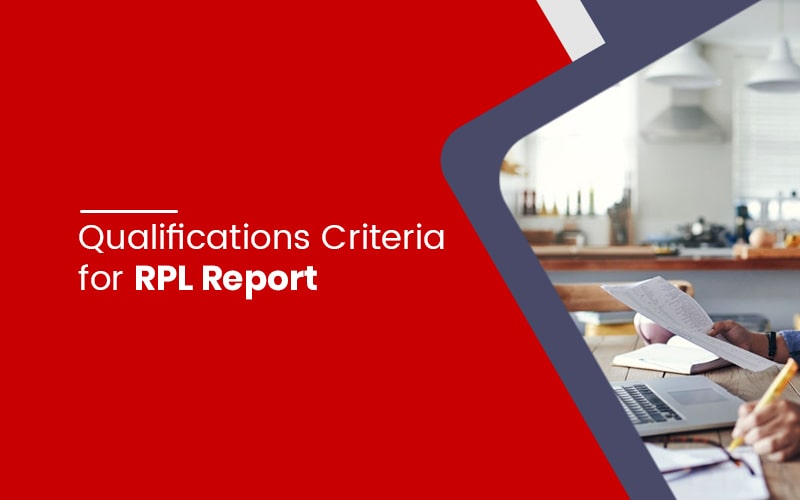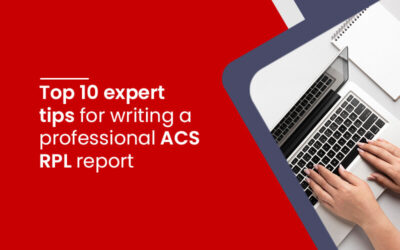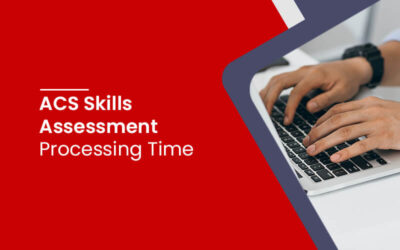What are the Qualification Criteria for RPL Report?

Table of Contents
- Qualification criteria for RPL report
- Accredited Australian ICT qualifications
- Assessment of ICT Content in Tertiary Qualifications
- A. ICT Major Criteria
- B. ICT Minor Criteria
- C. Inadequate ICT content
- D. Criteria for closely associated ICT material
- E. Academic Record Statement
- F. Qualification completed; graduation certificate still needs to be issued.
- G. Abstract for a Thesis or Research Project
- H. Prerequisites as per Region
- Requirements for assessing your qualifications for the RPL report
- Conclusion
The ACS Skill Assessment is essential for applicants seeking an Australian Skilled Migration visa. The applicant dreams of settling in Australia with a secure employment opportunity. The applicant’s experience should ideally align with the qualifications gained. You can find various qualification types for the ACS skill assessment and suitability criteria.
The Australian Computer Society (ACS) will assess applicants with an ICT background. This official body will be in charge of receiving your skill assessment. A Recognition of Prior Learning (RPL) report is required if you lack an ICT qualification. A RPL report is needed to evaluate whether the applicant’s skill matches the current need for expertise.
The RPL report to ACS is used to evaluate the skills of candidates who are not linked to ICT. The RPL report shows the applicant’s expertise and experience, which is needed for migration to Australia. Suppose you are a specialist with job experience in the field of ICT.
In that case, you must present an ACS RPL report to demonstrate that your qualification and qualifications match the ACS’s requirement for eligible migration to Australia. And if you do not have any ICT experience or a degree, you will have the opportunity to demonstrate your skills and knowledge.
The RPL report is critical for immigrants who have applied for eligible immigration to Australia but do not hold the same degree as Australian universities. It is also critical to apply the ACS RPL report in the proper format for the ACS to approve eligible immigration to Australia.
Your submission will be denied if you do not fill out the application correctly and do not meet the RPL report requirements. Furthermore, the ACS can prevent you from reapplying for a year if you submit a plagiarized copy, which will cost you a lot of time and money.
Qualification criteria for RPL report
Recognition of Prior Learning (RPL) is a process that evaluates an individual’s prior learning and experience to determine their level of competency in a specific field or area of study. This can include formal education, work experience, industry training, and professional development programs. The qualification criteria for an RPL report will differ depending on the program or institution assessing the individual’s prior learning.
Here are some of the qualifications required for the RPL report:
Accredited Australian ICT qualifications
Applicants with an Australian degree accredited by the ACS society will meet the ICT Major Criteria. However, this will not guarantee that the qualification will be evaluated with relevance to the ANZSCO occupation.
Assessment of ICT Content in Tertiary Qualifications
Qualifications in this group are evaluated as possessing either an ICT Major or an ICT Minor in computing. The ICT content is assessed as a Non-ICT qualification if it is less than a minor.
A. ICT Major Criteria
1. Bachelor’s Degree Level
Applicants will be considered to have a major in the computing sector if they have three years of bachelor’s qualification. Provided that at least 33% of the academic qualification is in the Information and Communication Technology field. If your qualification is longer, it is assessed as equivalent to a three-year AQF Level 7 award, i.e., a bachelor’s.
2. Diploma, Advanced Diploma, or Associate Degree Level
A certificate, intermediate diploma, or associate degree combined with a major in computing is considered to have a major in computing if at least 50% of the qualification is in ICT. The longer-duration certification is evaluated to be the equivalent of a regular AQF level 5 or 6 award.
Read More: Benefits of RPL report writing service for engineers. 💪💪
3. Post Graduate Degree Level
A postgraduate degree that does not require a bachelor’s degree with an ICT major for admission into the course is considered a computing major if at least 50% of the qualification is ICT. With just 12 subjects, an Australian postgraduate degree must have at least 67 percent ICT material. Longer-term qualifications are evaluated at the equivalent of an AQF Level 8 or higher certificate.
- A total of three semesters in minimum, or at least one and a half years of full-time study, is required for Australian postgraduate qualifications.
- A minimum of two semesters or one year of full-time comparable ICT content;
- A minimum of twelve units or subjects is required.
A postgraduate qualification that requires a Bachelor’s certification with a major in ICT for admission into the course must have at least 33% ICT content, all of which must be at the postgraduate level.
B. ICT Minor Criteria
Provided that the ICT material is at least two-thirds of the requirement for a major, a bachelor’s degree is considered a minor in computing.
C. Inadequate ICT content
Qualifications of less than the necessary ICT material for a major are classified as Non-ICT.
D. Criteria for closely associated ICT material
For the suitability requirements to be met, the education certificate must include at least 65 percent of ICT material applicable to the alleged profession.
Learn More: Best ways to write a CDR report to get maximum points for Australian Immigration. ✌️✌️
E. Academic Record Statement
Your undergraduate record should list completed courses and the grade points earned. If necessary, candidates should have a legend or key outlining the grading system to help clarify details. Web reports and result slips are inadmissible.
F. Qualification completed; graduation certificate still needs to be issued.
If applicants have finished their qualifications but still need to obtain their certificates, an official statement specifying the course completion date must be given.
G. Abstract for a Thesis or Research Project
A thesis or research report summary is needed if the certification requires a thesis or research report. The title of the thesis’s publication must be used. The supervisor’s name and the institution’s name should be included in the abstract. The number (percentage) and nature of ICT material relating to the nominated ANZSCO codes should be included on the front page of the abstract.
H. Prerequisites as per Region
1. Accord of Bologna
A diploma substitute must be submitted if the applicant is from a signatory country to the Bologna Agreement.
2. People’s Republic of China (PRC)
If the applicant is from the People’s Republic of China (PRC), the graduation diploma and award certificate must be submitted following the PRC’s Academic Degree Regulations.
3. Pakistan
If the applicant is from Pakistan, an attested copy of the award certificate and full academic transcript must be issued by the HEC (Higher Education Commission Pakistan).
4. Philippines
If the applicant is from the Philippines, proof of passing the Professional Regulation Commission’s Licensure Examinations, if applicable, should be requested.
Bonus: What is ACS RPL Assessment for Australian Immigration? 🌟🌟
Requirements for assessing your qualifications for the RPL report

Understanding the criteria that will be used to evaluate your prior learning when applying for RPL. When evaluating an individual’s qualifications for RPL, the following types of evidence are typically considered:
- Proof of prior knowledge: This can include advanced diplomas, certificates, or other academic record statements that show the individual’s expertise in a particular subject or field of study. For instance, you might be asked to present proof of your trade qualifications or apprenticeship certificates if you apply for RPL in a particular trade.
- Work experience: Relevant work experience and job history in the field or area of study being evaluated can also be used to demonstrate prior learning. Job descriptions, employment reference letters, and performance evaluations are all examples of this.
- Training in the industry or professional development: Participation in industry training or professional development programs can also be used as prior learning evidence. This can include completion certificates, course outlines, and training materials.
- Self-reflection: The individual must reflect on their prior learning and demonstrate how it relates to the field or area of study under consideration. This can include completing a self-assessment or writing a report.
- Additional evaluations: In some cases, an individual may be required to complete additional evaluations or training to demonstrate competence in certain areas. Written tests, practical assessments, and interviews with industry experts are all possibilities.
It’s important to remember that the RPL process is meant to be adaptable and tailored to each individual’s specific situation. The criteria and evidence required will differ depending on the program or institution, and the individual’s prior learning will be evaluated individually.
Conclusion
Overall, the RPL process is intended to assist individuals in gaining recognition for prior learning and experience and provide a pathway for further education and career development. Individuals can improve their chances of success in the RPL process by understanding the qualification criteria and preparing the necessary evidence.
We have licensed experts working on your positive ACS society skill assessment. Besides that, we provide CDR report writing, KA02 report writing, RPL report, and review services. You can message us for further queries and information regarding the RPL report.
Recent Posts
- Benefits of RPL Writing for Professional Advancement—Seize the Opportunity! July 8, 2024
- Unlocking Your Potential: Benefits of NER Registration for Engineers—Don’t miss out! July 4, 2024
- 8 Advantages of being a Registered NER Engineer April 25, 2024
- Stage 1 Competency Standard for Professional Engineer December 4, 2023
- Secure Your Future: The Most In Demand Jobs for Skilled Migrants to Australia in 2024 November 3, 2023






